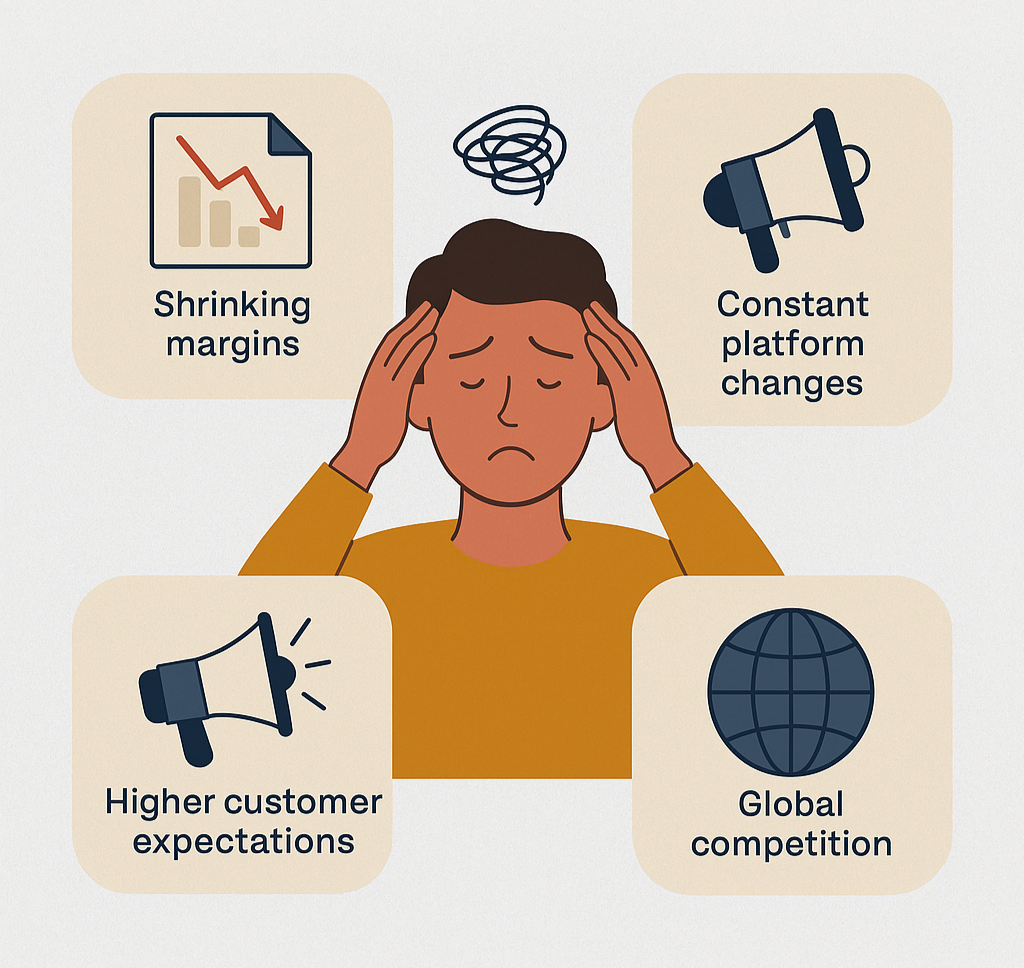
It’s not you. e-Commerce in 2025 is nothing like it was five years ago. Margins are tighter, attention spans shorter, and competition is global. But the hardest part? The rules keep changing, and no one told the small players.
When e-commerce was newer, simply launching a decent online store felt like enough. Today, however, just being online is far from sufficient. With rapidly evolving technology, ever-changing consumer behaviours, and constant platform updates, managing an online shop has become significantly more complicated. The complexity is leaving micro-businesses, those with teams small enough to count on one hand, feeling perpetually behind, overwhelmed and often exhausted.
Platform overload is real
Remember when your website was the centrepiece of your business? Now, you’re expected to master Instagram, navigate TikTok trends, showcase products on Pinterest, and possibly explore emerging platforms like Threads. And that is without forgetting your own website’s increasing needs for performance, security, GDPR compliance and so on. Each platform demands unique content, tailored messaging and regular updates.
Then add email marketing, ad management, customer support, inventory updates and order fulfilment. It quickly becomes clear why so many e-commerce owners feel more like full-time marketers than entrepreneurs. Small businesses often do not have the luxury of delegating these tasks to large teams or agencies, or the time and expertise to run things efficiently. In this scenario, AI can help to a certain degree, but without the necessary knowledge, it risks complicating things even further.
Customer Expectations Have Skyrocketed
Online shoppers today are not just looking for products; they are expecting a seamless experience from start to finish. Influenced by giants like Amazon, shoppers anticipate Prime-level delivery speeds, boutique-level personalised service, and Instagram-worthy packaging, even from the smallest businesses.
Additionally, modern consumers demand constant engagement and reassurance through social proof (in the form of reviews, user-generated content and influencer endorsements).
If your checkout experience is not seamless, or if your customer communications falter, potential buyers will not hesitate to abandon their carts. The expectation for perfection is disproportionately high, and many small brands find themselves stretched beyond capacity.
You’re competing against brands with big budgets
Many micro e-commerce brands operate as solo ventures or with just a handful of employees, often managing multiple roles simultaneously. Despite this, your direct competitors include brands backed by substantial funding, operating slick and sophisticated marketing machines.
Big-budget brands invest heavily in retargeting ads, intricate sales funnels, professional content production and customer loyalty programmes. All of this is carefully coordinated by dedicated teams. They have resources allocated exclusively to data analytics, performance tracking and continual optimisation.
Competing against these heavily resourced players with limited budgets and small teams can feel disheartening. Yet operating in a sector with larger competitors might also offer opportunities for smaller, more agile independent retailers with strong unique selling points.
Sometimes, online marketplaces with big marketing budgets that sell your products (such as Etsy or Not On The High Street) are the very ones you are competing with for attention.
Every win feels fleeting
Have you ever experienced a stellar sales month, only to find everything drops off again the next month? The rollercoaster ride of e-commerce success is particularly intense for micro-businesses. Algorithms that once favoured your content can suddenly shift, advertising costs can spike unexpectedly, and consumer trends can pivot overnight.
Each hard-won success can feel temporary, leaving shop owners continually chasing the next short-lived victory. The instability creates constant pressure, making it challenging to sustain motivation and enthusiasm. This is when the ability and confidence to navigate e-commerce cycles, forecast sales and maintain good cash flow become even more important.
It is easy to feel like marketing success requires doing everything, everywhere, all at once. And it can be truly overwhelming. That is where an experienced marketer would be able to steer a business through stages of growth by knowing what to execute, when to execute it and why it matters.
Most small e-commerce brands do not fail because they are lazy or lack ambition. They struggle because they are stuck between chaos and paralysis. And often cannot afford expensive consultants.
A simpler, smarter starting point
In this scenario, the ability to focus on what matters adds significant value to micro-business marketing.
Here’s the truth: effective marketing comes down to a mix of just three things. You need at least two out of Time, Knowledge and Budget to make consistent progress. Instead of rushing into another platform, campaign or agency retainer, this framework helps micro-businesses pause and focus. You ask: what do I actually have to work with right now? If you can identify at least two of the three levers you can reliably pull, you have the start of a system. From there, the goal is not to do more, but to do better, with less waste and more intention.
This focus is especially vital in e-commerce, where profit margins are unforgiving. Many small online retailers still lack a clear grasp of what it actually costs to fulfil an order or run their business month to month. Knowing your Cost of Goods Sold (COGS), your Gross Profit Margin, Operating Profit Margin and Net Profit Margin is not optional. It is the baseline. Without this, it is impossible to answer the simplest but most important question in marketing: how much should I spend to acquire a customer?
Smart marketing starts with those numbers. It is how you avoid spending £300 to make a £100 sale. It is also how you shift your focus, from throwing money at ads to nurturing customers you have already paid to acquire.
Your journey matters
If you have been feeling the weight of these challenges, know that you are not alone. The e-commerce landscape is demanding, but manageable.